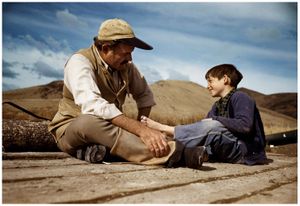Preface to Papa: A Personal Memoir

What characterizes every book about Hemingway I have read is the way his character remains out of focus. Even a writer with an edge as hard as Lillian Ross did not seem able to catch him properly in her famous New Yorker piece.[2] Hemingway was there, but much too precise in his portrait as if he had sat for one of those neo-realistic paintings where the pride of the artist is to make the subject look as if he has been photographed, not painted.
For contrast, there is Carlos Baker’s monumental biography[3] and it gives us an immense amount of day-to-day material somewhat modestly undigested. It is nonetheless an invaluable book which every ambitious biography to come will evaluate detail by detail, a necessary task, for Baker’s book was written with a determinedly soft focus as if the author felt his literary mission was not so much to present the man as to cover every year of Hemingway’s existence in the recollections of his friends.
There is also A. E. Hotchner’s book[4] which gives a portrait, and most readable it is, but askew. Hotchner is using a wide-angle lens; the very nostrils of the great man are distorted. Sadly we learn there is reason to believe the materials are transposed. A long and marvelously articulated speech which Hemingway makes once to Hotchner turns out in fact to have been taken from a letter. It is a minor literary peccadillo of the sort professional magazine writers commit often, since their skills mature in a school which demands you tell your story fast and make it track (and a quotation from a letter comes off slower than a man talking), but such methods breed distortion with their speed.
Now, we have here a book written by a son about his father, written by a son who is not a professional writer as he is quick to tell you (although he can write interestingly enough — it may even be a book which will be read at one sitting by more than half the readers who pick it up). That is because it is unlike most books written by sons about great fathers. There is nothing slavish here. The son lies to the father, and the father pays him back, meanly; the son loves the father and the father loves him back, but in his own style, and it is remote enough for the son to hate him a little as well. If it is a portrait written in love, it is with all the sweets and sours of love. What characterizes love when not wholly blissful is how damnably sweet and sour it gets. It kills any man or woman if they have the bad luck to be deeply in love with a veritable son of a bitch, and every bad thing we have ever heard about Hemingway can find its echo in this book. You do not have to wonder when you are done why any number of men and women could know Hemingway well and hate him. Yet everything fine, noble, attractive, and splendid in the man comes in with its echo as well. For once, you can read a book about Hemingway and not have to decide whether you like him or not. He is there. By God, he exists. He is a father, good and bad by turns, even sensational and godawful on different days of the year, and his contradictions are now his unity, his dirty fighting and his love of craft come out of the same blood. We can feel the man present before us, and his complexes have now become no more than his moods. His pride and his evasions have become one man, his innocence and sophistication, his honesty and outsize snobbery, his romantic madness and inconceivably practical sense of how to be outrageously romantic, it all comes through as in no other book about Hemingway, and for the simplest reason — the father was real to the son. Whereas those of us who approach Hemingway from without have been in the position of trying to find the reality behind the legend, and that is an especially contemporary form of analysis which tends to come out wrong. Hemingway, when all is said, was a Midwestern boy seized by success and ripped out of every root, and he spent the rest of his life in trying to relocate some of his old sense of terra firma by following each movement of the wind (and there were many) through his talent and his dread. What a remarkable achievement, that the sense of that talent and dread, while hardly ever referred to in these pages, is nonetheless in every paragraph of this unassuming and affective memoir.
Notes
- ↑ From Hemingway, Gregory H. (1976). Papa: A Personal Memoir. Boston: Houghton Mifflin Company. Reprinted by Project Mailer with permission of the estate of Norman Mailer. (76.22)
- ↑ Ross, Lillian (May 13, 1950). "The Moods of Ernest Hemingway". New Yorker. Retrieved 2018-12-21.
- ↑ Baker, Carlos (1972). Ernest Hemingway: A Life Story. New York: Penguin.
- ↑ Hotchner, A. E. (1966). Papa Hemingway: A Personal Memoir. Open Road Media.